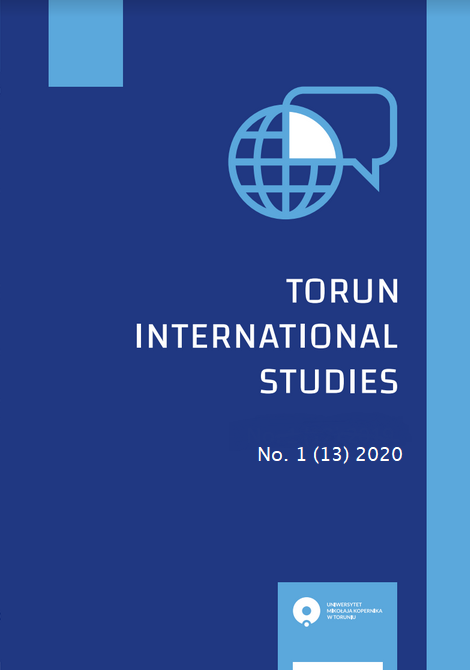DIGITIZATION AND ROBOTIZATION OF THE WORLD ECONOMY AS A KEY DETERMINANT OF THE INTERNATIONAL LABOR MARKET TRANSFORMATION
DOI:
https://doi.org/10.12775/TIS.2020.007Keywords
intellectual migrant, international migration, digitization, classification of virtual migrants, robotization, blockchain technologyAbstract
Today a lot of research is devoted to migration issues, primarily because of its scale. Previously, this problem attracted economists, sociologists, lawyers, today it is a focus of attention of political scientists and researchers of international relations. Modern globalization processes are affecting the international labor market, creating free space for the movement of labor around the world. The steadily increasing trend of labor migration is accounts for the need to study it in its social, economic and political aspects. Virtual migration refers to a new form of transnational economic integration that does not require workers to literally move in physical space. The main purposes of the article are to analyze the reasons and background of virtual of highly skilled workers. The positive and negative aspects of robotization on employment of highly qualified persons in the conditions of globalized world are determined. The aim of the study is also to find the opportunities that the globalized information space offers today to attract labor to international exchange and to justify on this basis the expediency of new migration orientations and new types of migration. Considering the global problems of labor migration, we note that the process of migration is the so-called indicator of the population's response to changes in the life of any society that happen almost every day.
References
Aneesh, A. (2006). Virtual Migration: the Programming of Globalization. Durham: Duke University Press.
Artificial Intelligence and Robotics and Their Impact on the Workplace. (2018). Retrieved March 1, 2020, from https://cms.law/en/DEU/News-Information/Artificial-Intelligence-and-Robotics-and-Their-Impact-on-the-Workplace
Chen, A. (2014). The Laborers who Keep the Dick Pics and Beheadings out of your Facebook Feed. Wired. Retrieved February 27, 2020, from https://www.wired.com/2014/10/content-moderation/
Chinorackýa, R., & Čorejováa, T. (2019). Impact of Digital Technologies on Labor Market and the Transport Sector. Transportation Research Procedia, 40, 994-1001. http://dx.doi.org/10.1016/j.trpro.2019.07.139
Dettmer, M., Hesse, M., Jung, A., Müller, M.U., & Schulz, T. (2016). Mensch Gegen Maschine. Der Spiegel. Retrieved February 20, 2020, from https://www.spiegel.de/spiegel/print/d-146612488.html
Freddi, D. (2018). Digitalisation and Employment in Manufacturing. AI & SOCIETY, 33(3), 393-403.
Huk, N. (2012). Change of Direction of Migration Flows of the Emergence of New Types of Migration Under the Influence of ICT. Zovnishnia Torhivlia: Ekonomika, Finansy, Pravo, 1, 90.
International Federation of Robotics. (2019). Executive Summary World Robotics 2019 Industrial Robots. Retrieved March 3, 2020, from https://ifr.org/downloads/press2018/Executive%20Summary%20WR%202019%20Industrial%20Robots.pdf
Krusell, P., Ohnian, L., Rios-Rull, J., & Violante, G. (2002). Capital-Skill Complementarity and Inequality: a Macroeconomic Analysis. Econometrica, 68(5), 1029–1053.
McCarthy, J. (2011). Computer Scientist Known as the Father of AI. Independent. Retrieved March 1, 2020, from http://www.independent.co.uk/news/obituaries/john-mccarthy-computer-scientist-known-as-the-father-of-ai-6255307.html
McKinsey Global Institute. (2017a). Jobs Lost, Jobs Gained: Workforce Transitions in a Time of Automation. Retrieved March 2, 2020, from https://www.mckinsey.com/~/media/mckinsey/featured%20insights/future%20of%20organizations/what%20the%20future%20of%20work%20will%20mean%20for%20jobs%20skills%20and%20wages/mgi%20jobs%20lost-jobs%20gained_report_december%202017.ashx
McKinsey Global Institute. (2017b). A Future that Works: Automation, Employment, and Productivity. Retrieved March 3, 2020, from https://www.mckinsey.com/~/media/McKinsey/Global%20Themes/Digital%20Disruption/Harnessing%20automation%20for%20a%20future%20that%20works/MGI-A-future-that-works-Executive-summary.ashx
Mykhajlova, K. (2008). Globalization Changes in Modern Society: Benefits and Risks for Domestic Education. Visnyk Mizhnarodnogho Slov'jansjkogho Universytetu, 1, 13–16.
Nahornyi, Y.V., Naumov, V.S., & Viter, N.S. (2010). The Analysis of the Basic Stages of the Container Development. Avtomobilnyi Transport, 26, 85-91.
Roberts, S. (2016). Digital Refuse: Canadian Garbage, Commercial Content Moderation and the Global Circulation of Social Media’s Waste. Journal of Mobile Media, 10(1).
Xiang, B. (2014). The Would-Be Migrant: Post-Socialist Primitive Accumulation, Potential Transnational Mobility, and the Displacement of the Present in Northeast China. Trans –Regional and National Studies of Southeast Asia, 2(2), 183-199.
Kupets, O. (2006). Determinants of Unemployment Duration in Ukraine. Journal of Comparative Economics, 34(2), 228-247.
Downloads
Published
How to Cite
Issue
Section
Stats
Number of views and downloads: 385
Number of citations: 0



